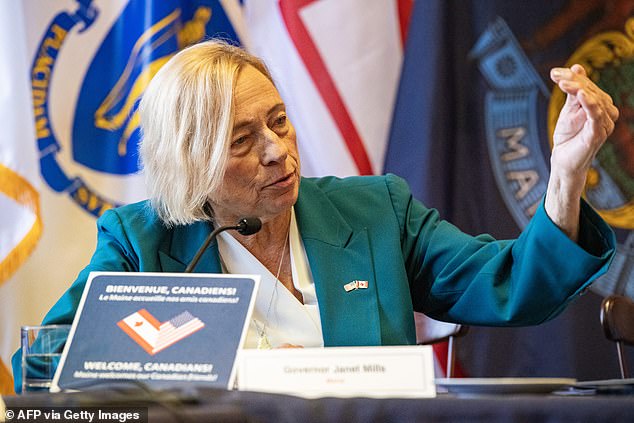
Maine Governor Janet Mills spiraled into a public outburst after being unexpectedly pressed about her alleged cocaine habit, stemming from a decades-old scandal.
The Democratic lawmaker, 77, was approached in Washington DC last month – with the man behind the camera asking jaw-dropping questions about the white powdery drug.
‘Is sniffing cocaine at work a human right, Janet,’ the brazen interviewer, who shared the footage with Fox Digital, asked the blue pant suit-wearing politician.
‘What the f**k,’ Mills responded as she briefly stopped in her tracks from the jarring question – a dig at a drug scandal she was accused of being involved in during the 1990s.
The persistent inquirer did not stop there, asking Mills how much the cost of an ‘eight ball’ – slang for an eight-ounce portion – has gone up due to inflation.
But she did not take the bait on that one and shared no response as she continued walking away.
This video was sent to Fox days after it was revealed the Department of Justice shot down Mills’ assertion that the investigation into her alleged drug use decades ago was politically motivated.
More than 30 years ago, Mills was probed by Maine’s US Attorney’s Office, the Drug Enforcement Administration (DEA) and the state’s Bureau of Intergovernmental Drug Enforcement (BIDE).

Maine Governor Janet Mills (pictured) spiraled into a public outburst after being unexpectedly pressed about her alleged cocaine habit, stemming from a decades-old scandal
Mills, who was then serving as a district attorney, was named in a tip from a drug suspect.
She was never charged with any crimes, and has since claimed she was subjected to the reputation-tarnishing accusations because of her left-leaning political stances and her criticism of BIDE.
‘It’s scary,’ Mills told the Portland Press Herald in 1991. ‘Maine apparently has a secret police force at work that can ruin the reputation of any who opposes it.’
Despite maintaining her stance that she was set up, Fox recently dug up a 1995 memo from the DOJ, claiming all of Mills’ claims that she was being libeled, slandered and politically attacked were ‘unsubstantiated.’
According to the memo, Mills had sued a WCSH-TV at the end of 1990 for reporting that she was being investigated by a grand jury over alleged illicit substance use.
Her lawyer then claimed ‘the press received leaks from BIDE law enforcement officials.’
While the details of the lawsuit brought against the reporter are not available, according to Fox, a Lewiston Sun-Journal story from 1991 states attempts to ‘end drug probe rumors’ were disregarded by a judge.

Mills (pictured), who was then serving as a district attorney, was named in a tip from a drug suspect
Mills had also accused investigators of falsifying testimonies and threatening witnesses to give unflattering statements, but the department found evidence of no such things.
‘The USAO in Maine conducted a proper investigation of serious allegations; no misconduct of any kind can fairly be attributed to any member of that office,’ the DOJ’s Office of Professional Responsibility found in 1995, according to Fox.
Mills recently found her self embroiled in a transgender sports battle with President Donald Trump.
Trump had accused Maine of failing to comply with his executive order barring transgender athletes from sports.
Soon after the secretary’s letter was sent, Maine’s Department of Education could not access several sources of federal funds for a state nutrition program, according to the court´s written order.

Donald Trump (pictured) agreed to halt all efforts to freeze funds intended for the state’s child nutrition program after initially suspending those dollars due to the disagreement
Maine quickly sued the Trump administration, where the state’s attorneys argued that the child nutrition program received or was due to receive more than $1.8 million for the current fiscal year.
At the start of May, Trump agreed to halt all efforts to freeze funds intended for the state’s child nutrition program after initially suspending those dollars due to the disagreement.
In response, the state dropped its lawsuit that had been filed against the US Department of Agriculture (USDA), Maine Attorney General Aaron Frey announced.
‘It’s unfortunate that my office had to resort to federal court just to get USDA to comply with the law and its own regulations,’ Frey said in a statement.






